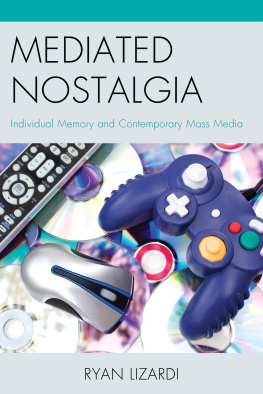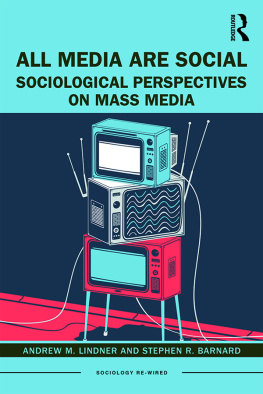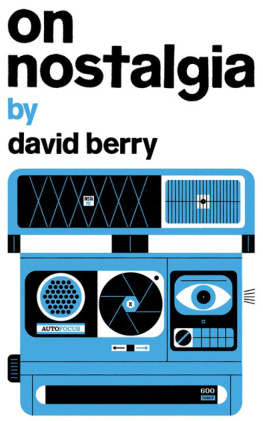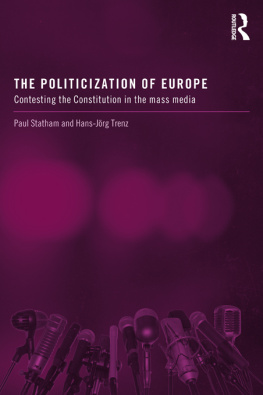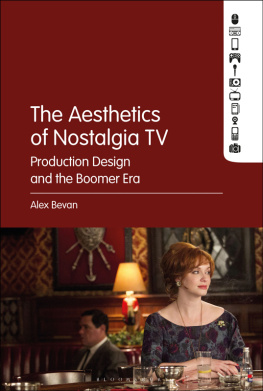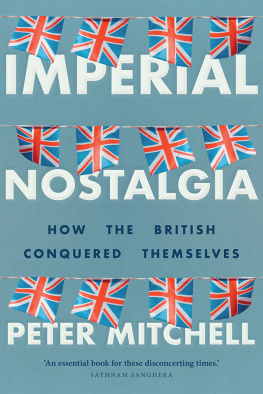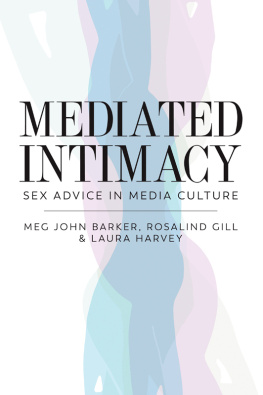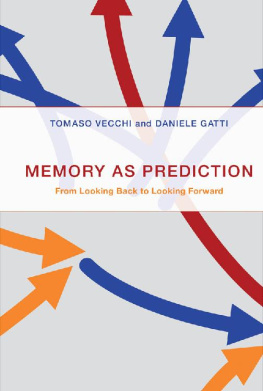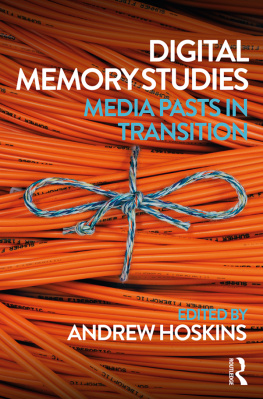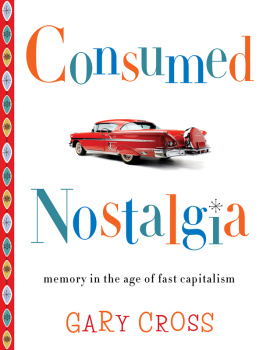Lizardi - Mediated nostalgia: individual memory and contemporary mass media
Here you can read online Lizardi - Mediated nostalgia: individual memory and contemporary mass media full text of the book (entire story) in english for free. Download pdf and epub, get meaning, cover and reviews about this ebook. City: Media (Ancient kingdom, year: 2015;2012, publisher: Lexington Books, genre: Romance novel. Description of the work, (preface) as well as reviews are available. Best literature library LitArk.com created for fans of good reading and offers a wide selection of genres:
Romance novel
Science fiction
Adventure
Detective
Science
History
Home and family
Prose
Art
Politics
Computer
Non-fiction
Religion
Business
Children
Humor
Choose a favorite category and find really read worthwhile books. Enjoy immersion in the world of imagination, feel the emotions of the characters or learn something new for yourself, make an fascinating discovery.
- Book:Mediated nostalgia: individual memory and contemporary mass media
- Author:
- Publisher:Lexington Books
- Genre:
- Year:2015;2012
- City:Media (Ancient kingdom
- Rating:5 / 5
- Favourites:Add to favourites
- Your mark:
- 100
- 1
- 2
- 3
- 4
- 5
Mediated nostalgia: individual memory and contemporary mass media: summary, description and annotation
We offer to read an annotation, description, summary or preface (depends on what the author of the book "Mediated nostalgia: individual memory and contemporary mass media" wrote himself). If you haven't found the necessary information about the book — write in the comments, we will try to find it.
Lizardi: author's other books
Who wrote Mediated nostalgia: individual memory and contemporary mass media? Find out the surname, the name of the author of the book and a list of all author's works by series.
Mediated nostalgia: individual memory and contemporary mass media — read online for free the complete book (whole text) full work
Below is the text of the book, divided by pages. System saving the place of the last page read, allows you to conveniently read the book "Mediated nostalgia: individual memory and contemporary mass media" online for free, without having to search again every time where you left off. Put a bookmark, and you can go to the page where you finished reading at any time.
Font size:
Interval:
Bookmark:
Mediated Nostalgia
Mediated Nostalgia
Individual Memory and
Contemporary Mass Media
Ryan Lizardi
LEXINGTON BOOKS
Lanham Boulder New York London
Published by Lexington Books
An imprint of The Rowman & Littlefield Publishing Group, Inc.
4501 Forbes Boulevard, Suite 200, Lanham, Maryland 20706
www.rowman.com
16 Carlisle Street, London W1D 3BT, United Kingdom
Copyright 2015 by Lexington Books
All rights reserved. No part of this book may be reproduced in any form or by any electronic or mechanical means, including information storage and retrieval systems, without written permission from the publisher, except by a reviewer who may quote passages in a review.
British Library Cataloguing in Publication Information Available
Library of Congress Cataloging-in-Publication Data
Lizardi, Ryan, 1981
Mediated nostalgia : individual memory and contemporary mass media / Ryan Lizardi.
pages cm.
Includes bibliographical references and index.
ISBN 978-0-7391-9621-2 (cloth : alk. paper) ISBN 978-0-7391-9622-9 (electronic)
Mass mediaSocial aspects. 2. NostalgiaSocial aspects. 3. Mediapsychological aspects. 4. Collective memory. I. Title.
HM1206.L585 2015
302.23dc23
2014033121
 TM The paper used in this publication meets the minimum requirements of American National Standard for Information Sciences Permanence of Paper for Printed Library Materials, ANSI/NISO Z39.48-1992.
TM The paper used in this publication meets the minimum requirements of American National Standard for Information Sciences Permanence of Paper for Printed Library Materials, ANSI/NISO Z39.48-1992.
Printed in the United States of America
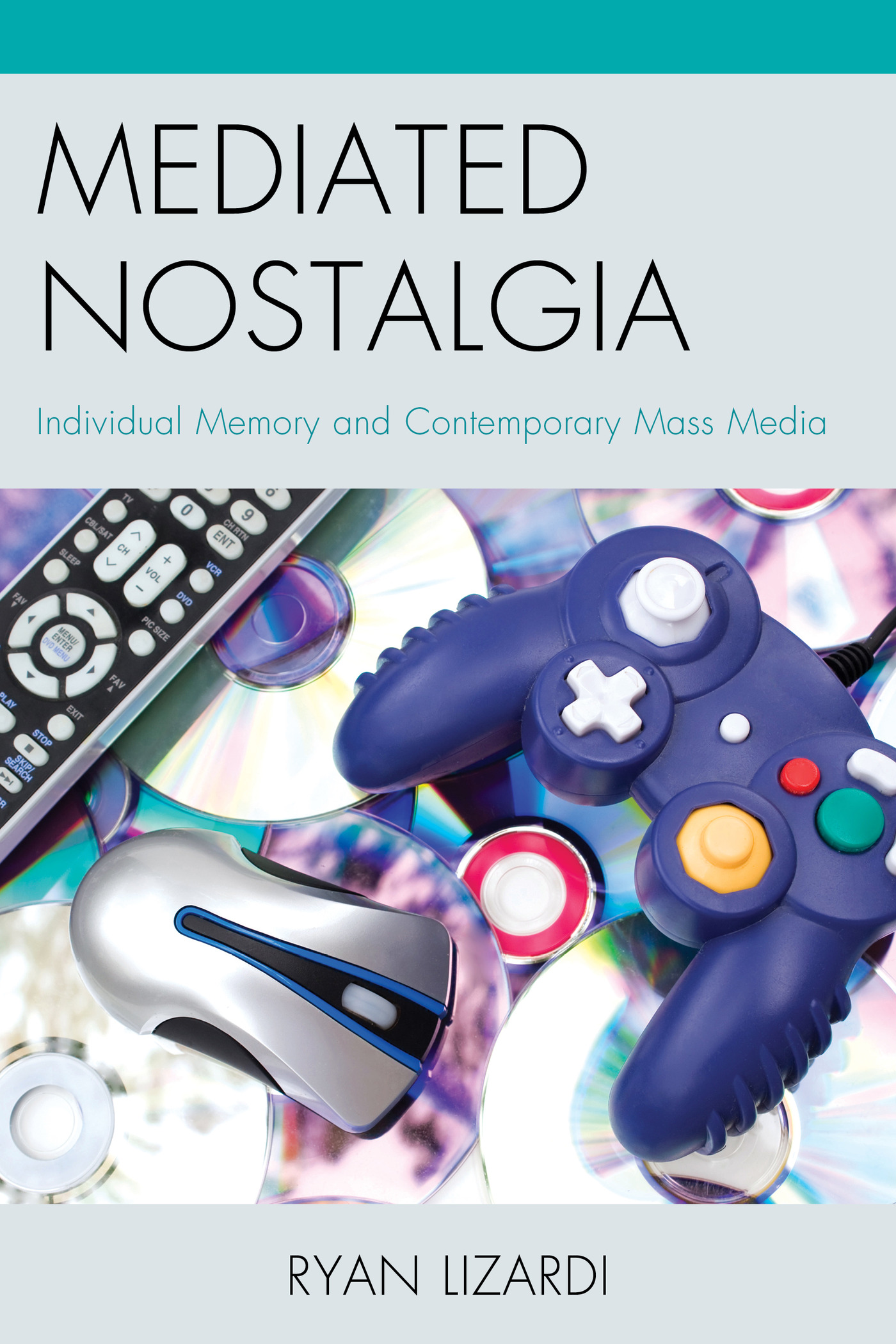
At the heart of the first Harry Potter is a dilemma that paralyzes the young protagonist, one that speaks to a similar dilemma in contemporary medias construction of the individual. Harry has always been nostalgic about his parents, victims of the dark wizard Voldemorts evil magic. He is shown an enchanted object that allows him to live in a past that was lost to him, the Mirror of Erised, and he finds himself unable to pull away from this pleasant reflection of a world where everything appears to be uncomplicated. Pointedly, Albus Dumbledore tells Harry that It does not do to dwell on dreams Harry, and forget to live in an attempt to stop him from looking into the Mirror of Erised (an anagram for desire) (Rowling 1997, 214), an object that shows each individualized viewer their deepest and most desperate desires of our hearts (Rowling 1997, 213). Dumbledore warns that the images created by this mirror will give us neither knowledge or truth and that men have wasted away in front of it (Rowling 1997, 213). The viewer of contemporary media culture has been placed in a similar position, lured by a recent narrative trend that is constructing us as past-focused subjects and has us fixing on a recent past. Just as Harry is made to stare transfixed at an idealized version of his past, rendering him incapable of dealing with present problems, so too has our convergent media presented us with an analogous dilemma, situating us as viewers face-to-face with our own mirror of narcissistic nostalgic desire. Where we could use the past as an adaptive functional mirror with which we could compare and contrast to our contemporary situation, possibly learning something along the way, the past instead is the same individualized version that transfixes Harry, thereby constructing us as uncritical citizens of our own culture.
Philosophers of history and critical theorists have long considered the individual and cultural dangers of historical musing in excess. As historian Hayden White says, advocating for adaptive historical discourse, the study of the past as an end in itself can only appear as thoughtless obstructionism, as willful resistance to the attempt to close with the present world in all its strangeness and mystery (1985, 41). While White was concerned with literary and later filmic representation, the representations of the past witnessed in contemporary mass media have exponentially amplified this nostalgic trend and modality, seen in forms from film to video games to television. White, then, can be used to understand how a myopic and perpetual view of history, such as the one Dumbledore warns can be destructive, is dangerous to a healthy past engagement that might utilize and learn from history.
Before beginning, it will be helpful to provide a working definition of key terms that will be important throughout this exploration: nostalgia, narcissism as it pertains to nostalgia, melancholia as compared to mourning, and perpetual as it relates to melancholia. The nuances of nostalgia and its progression from a 17th century malady to a contemporary description of longing that is polysemic will be discussed later in this chapter, but for our purposes nostalgia will refer to a yearning for the past or some past state, which results in the focusing in on the past or a past object to assuage this yearning and to reassure already held ideological positions. Nostalgia should not be considered automatically or universally problematic, though some critics have warned of the dangers of stasis, the failure to change inherent (Bonnett 2010, 3), as even a yearning consideration of the past could have adaptive potential for the future if utilized in a comparative manner. What will be developed is that contemporary media nostalgia engenders a perpetual melancholic form of narcissistic nostalgia as opposed to a comparative, collective, or adaptive view of history. Narcissism, in connection with nostalgia, will be defined as the focus of yearning on an individual and solipsistic level, though not simply in terms of the history of ones life. Instead, narcissistic nostalgia is exploited by contemporary media to develop individualized pasts that are defined by idealized versions of beloved lost media texts pumped up with psychic investment to a level of unreality. These media texts are returned to on a continuous loop of nostalgic behavior/practice, engendering subjectivity that can be explained by the difference between Freuds conceptions of mourning and melancholia. For Freud, mourning is a healthy and natural form of longing for the past where the mourner works through the past as an avenue for improving the present or future (Jordan 2002, 89). On the other hand, Freud views melancholia as the attempt to re-create the past, demonstrating the loss of capacity to adopt a new object of love (Freud as quoted in Jordan 2002, 89). Related to later discussions of misrecognizing an idealized past reality in a nostalgic media object, the melancholic refuses to relinquish the beloved childhood text. Michael S. Roth highlights nostalgias childhood-rooted tendency by noting almost all identified the origins of the disease in the first affective connections to people and places in the childs world mainly because the first impressions on the brain were permanent (1991, 9). The nostalgic experiences the desire to return to the scene of those impressions and [s]ince they were never erased, they could become the object of attachment at almost any time (1991, 9). Never being erased points toward melancholia and Roth goes on to say that nostalgia outwardly presents itself paradoxically as those who are afflictedsoldiers for Rothdid not even call attention to their malady but quietly pursued their desire to return to the past until death (1991, 22). Walter Benjamin expresses a similar sentiment when describing his difficulty of stopping the nostalgic activity of unpacking his library (1968, 66), while Adorno describes regressive listening as the desire to reverse to childhood happiness (2001, 47). These sentiments bring us to the definition of perpetual nostalgia; that like a perpetual motion machine it continues to persist by coming back to the same point and reproducing itself. It is the construction of the narcissistic, melancholic, and perpetual tendency of contemporary media.
Next pageFont size:
Interval:
Bookmark:
Similar books «Mediated nostalgia: individual memory and contemporary mass media»
Look at similar books to Mediated nostalgia: individual memory and contemporary mass media. We have selected literature similar in name and meaning in the hope of providing readers with more options to find new, interesting, not yet read works.
Discussion, reviews of the book Mediated nostalgia: individual memory and contemporary mass media and just readers' own opinions. Leave your comments, write what you think about the work, its meaning or the main characters. Specify what exactly you liked and what you didn't like, and why you think so.

